Related Research Articles

Samuel Gridley Howe was an American physician, abolitionist, and advocate of education for the blind. He organized and was the first director of the Perkins Institution. In 1824 he had gone to Greece to serve in the revolution as a surgeon; he also commanded troops. He arranged for support for refugees and brought many Greek children back to Boston with him for their education.

George Stillman Hillard was an American lawyer and author. Besides developing his Boston legal practice, he served in the Massachusetts legislature, edited several Boston journals, and wrote on literature, politics and travel.

Rufus Choate was an American lawyer, orator, and Senator who represented Massachusetts as a member of the Whig Party. He is regarded as one of the greatest American lawyers of the 19th century, arguing over a thousand cases in a lifetime practice extending to virtually every branch of the law then recognized. Notably, he was one of the pioneers of the legal technique of arousing jury sympathy in tort cases. In one instance, he successfully won a record judgement of $22,500 for a badly injured widow, the most ever awarded to a plaintiff at the time. Along with his colleague and close associate Daniel Webster, he is also regarded as one of the greatest orators of his age. Among his most famous orations are his Address on TheColonial Age of New England delivered at the centennial celebration of the settlement of Ipswich, Massachusetts in 1831 and his Address on The Age of the Pilgrims as the Heroic Period of Our History before the New England Society of New York in 1843. Through these addresses, Choate became one of the most prominent advocates of promoting the Puritan settlers as the first founders of the American republic. A staunch nationalist and unionist, Choate was among several former Whigs to oppose the Republican Party over concerns that it was a "sectional party" whose platform threatened to separate the Union. In turn, he publicly voiced his support for Democratic candidate James Buchannan over Republican John C. Fremont in the 1856 Presidential election.

Samuel Hoar was a United States lawyer and politician. A member of a prominent political family in Massachusetts, he was a leading 19th century lawyer of that state. He was associated with the Federalist Party until its decline after the War of 1812. Over his career, Hoar developed a reputation as a prominent Massachusetts anti-slavery politician and spokesperson. He became a leading member of the Massachusetts Whig Party, a leading and founding member of the Massachusetts Free Soil Party, and a founding member and chair of the committee that organized the founding convention for the Massachusetts Republican Party in 1854.

The Boston Brahmins or Boston elite are members of Boston's traditional upper class. They are often associated with Harvard University, Anglicanism, and traditional Anglo-American customs and clothing. Descendants of the earliest English colonists are typically considered to be the most representative of the Boston Brahmins. They are considered White Anglo-Saxon Protestants (WASPs).

Robert McClelland was a US statesman, serving as U.S. Representative from Michigan, the ninth governor of Michigan, and United States Secretary of the Interior.
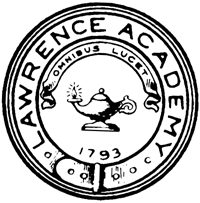
Lawrence Academy at Groton is a private, nonsectarian, coeducational college preparatory boarding school located in Groton, Massachusetts, in the United States. Founded in 1792 by a group of fifty residents of Groton and Pepperell, Massachusetts as Groton Academy, and chartered in 1793 by Governor John Hancock, Lawrence is the tenth oldest boarding school in the United States, and the third in Massachusetts, following Governor Dummer Academy (1763) and Phillips Academy at Andover (1778). The phrase on Lawrence Academy's seal is "Omnibus Lucet": in Latin, "Let light shine upon all."
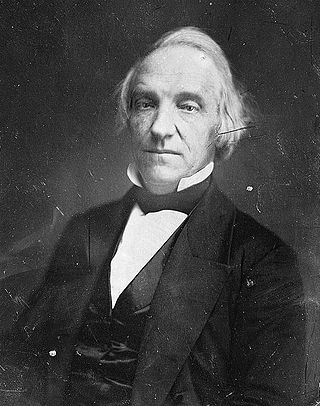
Daniel Stevens Dickinson was an American politician and lawyer, most notable as a United States senator from 1844 to 1851.
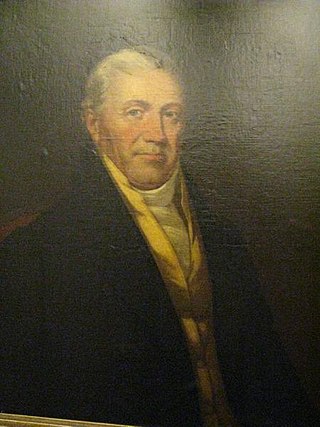
Benjamin Pierce was an American soldier, farmer and politician who twice served as the governor of New Hampshire from 1827 to 1828 and from 1829 to 1830. Pierce fought during the American Revolutionary War before becoming a Democratic-Republican Party politician. He was the father of Franklin Pierce, the 14th president of the United States.
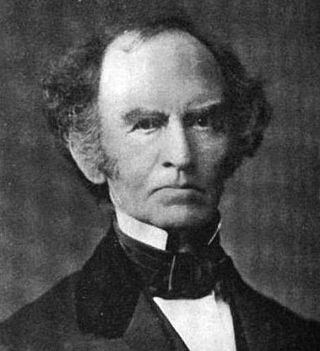
Edward Dickinson was an American politician from Massachusetts. He is also known as the father of the poet Emily Dickinson; their family home in Amherst, the Dickinson Homestead, is a museum dedicated to her.

Dwight Foster was an American lawyer and politician from Massachusetts. He served in the Massachusetts House of Representatives, the United States House of Representatives and the United States Senate.
Eli Porter Ashmun was a Federalist United States Senator from Massachusetts from 1816 to 1818.

Marcus Junius Parrott was a delegate to Congress from the Kansas Territory from 1857 until 1861.
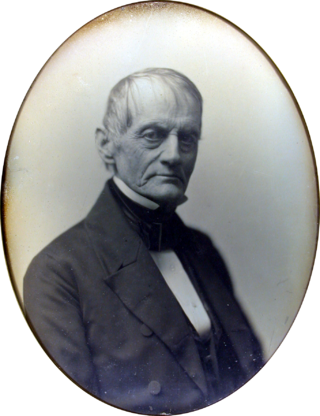
William Appleton was an American businessman and politician from Massachusetts. He was a trader, shipowner, and banker, and served as a U.S. representative from Massachusetts from 1851 to 1855, and again from 1861 to 1862.

George Ashmun was a Whig member of the U.S. House of Representatives from Massachusetts.

Benjamin Pickman Jr. was a U.S. Representative from Massachusetts.
The 59th Massachusetts General Court, consisting of the Massachusetts Senate and the Massachusetts House of Representatives, met in 1838 during the governorship of Edward Everett. Myron Lawrence served as president of the Senate and Robert Charles Winthrop served as speaker of the House.
The 60th Massachusetts General Court, consisting of the Massachusetts Senate and the Massachusetts House of Representatives, met in 1839 during the governorship of Edward Everett. Myron Lawrence served as president of the Senate and Robert Charles Winthrop served as speaker of the House.
Ashmun is a surname that may refer to:
References
- ↑ Ellis, Rufus, Memoir of the Hon. Samuel Howe, 1850, pages 25 to 28
- ↑ Rines, George Edwin and Beach, Frederick Converse, editors, The Encyclopedia Americana, Volume 9, 1904, entry for "LAW"
- ↑ Clark, Solomon, Antiquities, Historicals and Graduates of Northampton, 1882, page 277
- ↑ King, David C., Presidents and Their Times: Franklin Pierce, 2009, page 18
- ↑ Magazine article, A Great lady of New England, The Dial magazine, October 6, 1900, page 262
- ↑ Official Congressional Biography, William Adams Walker, accessed March 21, 2012
- ↑ Gidmark, Jill B., Encyclopedia of American Literature of the Sea and Great Lakes, 2001, page 51
- ↑ Holland, Josiah Gilbert, History of Western Massachusetts, 1855, Volume 2, page 173
- ↑ Reed, George Irving, Bench and Bar of Michigan, 1897, page 8